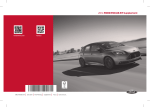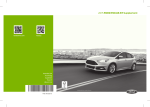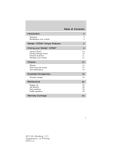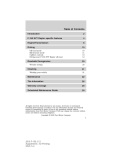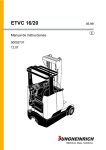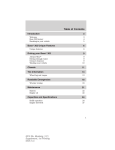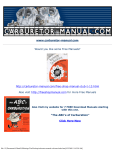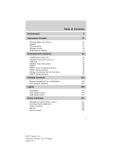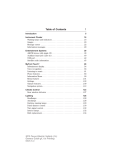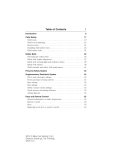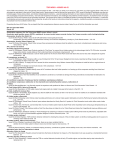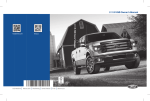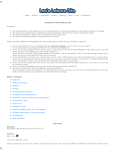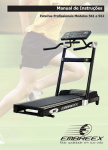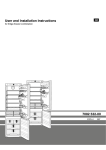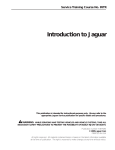Download Table of Contents - Ford Focus ST Forum
Transcript
Table of Contents Introduction Welcome Breaking-in your vehicle Focus ST Unique Features Gauges 2 2 4 5 6 Driving Your Focus ST 10 Transmission operation AdvanceTrac威 Engine over-rev 10 12 13 Wheels and Tires Wheels Wheel lug nut torque Tire information Roadside Emergencies Wrecker towing Maintenance Under hood overview 14 14 14 15 18 18 19 19 Capacities and Specifications 21 Engine specifications Technical specifications Transmission code designation 21 25 27 Warranty Coverage 28 The information contained in this publication was correct at the time of going to print. In the interest of continuous development, we reserve the right to change specifications, design or equipment at any time without notice or obligation. No part of this publication may be reproduced, transmitted, stored in a retrieval system or translated into any language in any form by any means without our written permission. Errors and omissions excepted. © Ford Motor Company 2012 1 2013 Focus ST (stf) Supplement, 1st Printing USA (fus) Introduction WELCOME Congratulations on your decision to purchase or lease the latest from the Ford Global Performance Vehicle team – the Focus ST. If you’ve owned or leased an SVT product in the past, we’re glad you’re back. If this is your first Ford performance vehicle, welcome to the family! We are confident that our dedication to performance, quality, craftsmanship and customer service will provide many miles of exhilarating, safe and comfortable driving in your new Focus ST. Your choice of an ST product is an intelligent and informed one. We strive to build engaging vehicles that involve the driver in every aspect of the driving experience. Although performance is at the heart of every ST vehicle, we go much further. Our goal is to deliver a comprehensive, complete vehicle, sweating the details such as the sound of the exhaust, the quality of the interior materials, and the functionality and the comfort of the seats, to make sure that the driver enjoys not only exceptional performance but an outstanding driving environment as well. In the Focus ST, that philosophy is expressed by a sophisticated powertrain, outstanding chassis dynamics and significant interior and exterior enhancements. This supplement complements your Focus Owner’s Manual and provides information specific to the Focus ST. By referring to the pages listed in this supplement, you can identify those features, recommendations and specifications unique to your new Focus ST. If there are any discrepancies between this supplement and the Focus Owner’s Manual, this supplement shall supersede the information found in the Focus Owner’s Manual. If you have any questions or concerns regarding your Focus ST, please call the Ford Performance Info Center at 1-800-FORD-SVT (367-3788). 2 2013 Focus ST (stf) Supplement, 1st Printing USA (fus) Introduction SVT HISTORY The Ford Special Vehicle Team (SVT) was established in 1991 to “Polish the Ford Oval” by creating low-volume, factory-produced vehicles designed for those select few whose idea of driving is a high-powered, passionate experience — not just a means of getting from point A to point B. In a move to support this spirited enthusiasm, Ford Motor Company carefully integrated the wide array of talent in the company into a small, cross-functional group of engineers and product planners, housed together under one roof with a common mission: to create vehicles specifically designed to meet the unique needs and desires of the knowledgeable driving enthusiast. Nearly 150,000 SVT vehicles have been produced since the 1993 model year. These include the SVT Mustang Cobra and the Cobra R, the SVT F-150 Lightning, the SVT Contour, the SVT Focus, Ford GT, Shelby GT500, GT500KR and the F-150 SVT Raptor. TEAM RS HISTORY TeamRS traces it’s roots back nearly 60 years from the Lotus Ford Cortina and Twin Cam Escorts of the mid 1960’s, through the first RS branded Escorts of the 1970’s to the founding of Special Vehicle Engineering (SVE) in 1980. Through the 1980s and 90s, SVE delivered a breadth of vehicles from exciting XR and RS branded road going performance cars through ’homologation specials’ such as the iconic Sierra Cosworth RS500. The first ST (Sport Technology) vehicle appeared in 1996 as the ST24 Mondeo. The first collaboration between Ford’s European and North American performance teams appeared in 2002 as the ST170 in Europe and SVT Focus in North America. In 2003, TeamRS replaced SVE in Europe as performance car and motorsport personnel were brought together as one team. TeamRS subsequently created the 2004 Fiesta ST, 2005 Focus ST and 2009 Focus RS. GLOBAL PERFORMANCE VEHICLES The Global Performance Vehicle (GPV) group was formally established in 2009, joining the performance product development excellence and heritage of SVT in North America and TeamRS in Europe. The Focus ST is the first vehicle to emerge from this group and represents the best of what Ford performance has to offer from around the globe. Your Focus ST has been designed and developed with the four hallmarks of the Ford Global Performance Group in mind: Performance, Substance, Exclusivity and Value. We are proud and passionate about what we do, and we’re glad you have made us your choice. 3 2013 Focus ST (stf) Supplement, 1st Printing USA (fus) Introduction BREAKING-IN YOUR VEHICLE Your vehicle does not need an extensive break-in. Try not to drive continuously at the same speed for the first 1000 miles (1600 km) of new vehicle operation. Vary your speed frequently in order to give the moving parts a chance to break in. Do not add friction modifier compounds or special break-in oils since these additives may prevent piston ring seating. 4 2013 Focus ST (stf) Supplement, 1st Printing USA (fus) Focus ST Unique Features • • • • • • • • • • • • • • • • • 2.0L GTDI EcoBoost I4 engine Overboost function for increased torque Electronic over-rev function with 6800 rpm redline ST tuned 2.5 in. center exit exhaust system Getrag-Ford MMT6 6-speed manual transaxle Active sound symposer Variable ratio steering Modified front suspension knuckle for improved wheel end geometry Cast rear knuckle (improved stiffness) and alternative anti-roll-bar mounting for improved efficiency ST tuned springs and dampers Increased diameter (320 mm) front brake rotors and unique calipers with ST tuned pad formulation front and rear Enhanced torque vectoring control with cornering understeer control ST tuned electric power assisted steering with torque steer compensation AdvanceTrac威 stability enhancement system with three modes: Normal, Sport and Disabled 18 in. x 8 in. 55 mm offset aluminum ST wheels P235/40-18 directional Goodyear Eagle F1 tires ST engineered front and rear fascias and rear wing 5 2013 Focus ST (stf) Supplement, 1st Printing USA (fus) Focus ST Unique Features • Optional Recaro front seats with increased lateral support and matching rear seat covers • Leather wrapped ST sport steering wheel with improved grip contour • ST unique instrument panel appliques, shift knob, shift boot and pedal pads • ST high-speed instrument cluster and auxiliary cluster with oil temperature, oil pressure and boost gauges GAUGES A. Oil temperature gauge B. Turbocharger boost gauge C. Oil pressure gauge A B C Oil temperature gauge Indicates the temperature of the engine oil. If it enters the red section, the engine is overheating. Reduce engine speed as soon as safely possible to allow the engine to cool. If the engine is continued to be driven at high engine speeds with the needle in the red section, the engine speed will be reduced automatically to prevent engine damage. Turbocharger boost gauge Indicates the added intake pressure provided by the turbocharger. 6 2013 Focus ST (stf) Supplement, 1st Printing USA (fus) Focus ST Unique Features Oil pressure gauge Indicates engine oil pressure. During normal driving the indicated oil pressure will vary with engine speed, the pressure rising as engine speed rises and dropping as engine speed drops. If the engine oil pressure drops below the normal range, the oil pressure gauge pointer will drop into the red section of the gauge scale and the engine oil pressure warning lamp in the main instrument cluster will illuminate. Stop the vehicle as soon as safely possible and switch off the engine immediately. Check the oil level and add oil if needed. Vehicle Specifications Item Transmission Gear ratios Description GFT MMT6 6-speed manual with 240 mm clutch and dual mass flywheel Gear Ratio Final Drive 1st 3.231 4.063 2nd 1.952 4.063 3rd 1.321 4.063 4th 1.029 4.063 5th 1.129 2.955 6th 0.943 2.955 Reverse 4.600 2.955 7 2013 Focus ST (stf) Supplement, 1st Printing USA (fus) Focus ST Unique Features Engine Information Item Configuration Bore x Stroke Displacement Compression ratio Horsepower Torque Redline Specific output Valvetrain Ignition Fuel system Throttle body Pistons Crankshaft Connecting rods Turbo Exhaust system Description Transverse mounted I4, cast aluminum cylinder block and cylinder heads 87.5 mm bore x 83.1 mm stroke (3.44 in. x 3.27 in.) 1999 cubic centimeters (122 cubic inches) 9.3:1 252 hp @ 5500 rpm on 93 octane 243 hp @ 5500 rpm on 87 octane 270 lb-ft @ 2500 rpm on 93 octane 270 lb-ft @ 2500 rpm on 87 octane 6500 rpm continuous 6800 rpm 3 second over-rev 126 hp/liter Twin independent variable cam timing Coil-on-plug 150 bar fuel pump 57 mm (2.2 in.) Cast aluminum Cast iron Forged steel Single scroll / 21 psi max boost* 63 mm (2.5 in.) diameter * SAE Certified Performance ratings are achieved with 19.5 psi, but up to 21 psi can be delivered to maximize power depending on fuel quality and atmospheric conditions. 8 2013 Focus ST (stf) Supplement, 1st Printing USA (fus) Focus ST Unique Features SUSPENSION Item Front suspension Rear suspension Front spring rate Rear spring rate Front stabilizer bar Rear stabilizer bar Description MacPherson strut with L-arm front suspension Fully independent control blade SLA with revised stabar routing 30 N/mm (171 lb/in.) 32 N/mm (183 lb/in.) 24 mm diameter x 4 mm thick hollow (.944 in x .157 in.) 22 mm diameter (.866 in. ) 9 2013 Focus ST (stf) Supplement, 1st Printing USA (fus) Driving Your Focus ST MANUAL 6-SPEED TRANSMISSION OPERATION Using the Clutch Note: During each shift, the clutch pedal must be fully pressed to the floor and the accelerator fully released. Failure to follow this may cause increased shift efforts, prematurely wear transmission components, or cause gear clash or damage to the transmission. Make sure the floor mat is properly positioned so it doesn’t interfere with the full extension of the clutch pedal. Note: If you attempt to shift when the drive wheels are spinning with a loss of traction, it is possible to cause damage to the transmission. Do not attempt to shift when the drive wheels do not have traction. Note: Do not drive with your foot resting on the clutch pedal or use the clutch pedal to hold your vehicle at a standstill while waiting on a hill. These actions will reduce the life of the clutch. Your vehicle is equipped with a twin disc clutch. Due to the high performance of the powertrain, a certain amount of noise from the transmission is normal. The manual transmission has a starter interlock that prevents cranking the engine unless the clutch pedal is fully pressed. To start the vehicle: 1. Make sure the parking brake is fully set. 2. Press the clutch pedal to the floor, then put the transmission selector lever in position N. 3. Start the engine, then press the brake pedal and release the parking brake. 10 2013 Focus ST (stf) Supplement, 1st Printing USA (fus) Driving Your Focus ST 4. Move the transmission selector lever to position 1, then slowly release the clutch pedal while slowly pressing on the accelerator. 5. To engage reverse, lift up on the reverse lockout ring located under the shift knob and move the transmission selector lever fully to the left and forward. Recommended Shift Speeds for Maximum Fuel Economy When accelerating, upshift according to the following chart: 1 2 3 4 5 - 2 3 4 5 6 Upshifts when accelerating* Shift from: 12 mph (19 km/h) 23 mph (37 km/h) 32 mph (51 km/h) 41 mph (66 km/h) 42 mph (67 km/h) *pending EPA fuel economy certification Operating at High Speeds Your ST vehicle is capable of high speeds and is equipped with tires rated for the vehicle’s maximum speed. Remember to drive safely, obey all traffic laws and only operate your ST vehicle at high speeds at locations equipped and designed to do so safely. Before operating your vehicle at high speeds: • Verify correct tire pressures (see Tires in this supplement). • Inspect wheels and tires for wear and damage. Replace any damaged wheels or tires. • Do not operate your vehicle at high speeds with more than two passengers or while carrying cargo. 11 2013 Focus ST (stf) Supplement, 1st Printing USA (fus) Driving Your Focus ST ADVANCETRAC姞 STABILITY ENHANCEMENT SYSTEM The AdvanceTrac威 system includes traction control (TCS) and electronic stability control (ESC). See the Traction Control and Stability Control chapters of the Owner’s Manual for more information AdvanceTrac威 provides three modes of operation specially calibrated for the Focus ST. These are controlled ESC OFF through the AdvanceTrac威 button on the center console. Mode Normal Sport Off AdvanceTrac威 Modes Description Button Operation Daily usage with None all driver aids engaged Spirited driving. Single press Thresholds altered on TCS and ESC to allow more tire spin and vehicle slip Track Use Only Press and hold TCS and ESC for 5 seconds are disabled 12 2013 Focus ST (stf) Supplement, 1st Printing USA (fus) Display None •Message center displays Sport Mode •Amber light in cluster illuminates •Message center displays Hold to switch ESC off, then •Electronic Stability Control off •Amber light in cluster illuminates Driving Your Focus ST ENHANCED TORQUE VECTORING CONTROL Enhanced torque vectoring control (eTVC) is comprised of two elements: • Torque vectoring control which applies brake torque on the inner wheel in a curve for better traction and less understeer • Cornering understeer control which controls the yaw response of the vehicle under braking and acceleration on high and low friction surfaces. Unlike ESC, eTVC control does not slow the vehicle but does help control excessive wheel slip and gives the vehicle cornering agility. The system only increases performance. Because of this, eTVC is not disabled when the AdvanceTrac威 system is off. ENGINE OVER-REV Note: Always wait until the engine is properly warmed up before running high engine speeds. Your vehicle is equipped with an over-rev feature to increase the performance range of your Focus ST. The standard maximum engine speed of 6500 rpm is indicated by a narrow redline on the tachometer face. The redline becomes thicker at the over-rev engine speed of 6800 rpm. This feature allows three seconds of over-rev above 6500 rpm. Once the three second limit has been reached, the electronically controlled rev limit ramps down to 6500 rpm and holds there. Once engine speed has dropped below 6300 rpm, the over-rev timer is reset and three seconds of over-rev up to a maximum of 6800 rpm is enabled. Do not operate the engine at high rpm and low load for sustained periods of time, as damage may occur. OVERBOOST The Focus ST offers a period of additional torque delivery referred to as overboost or overtorque. This feature of the engine calibration broadens the RPM range of the peak torque curve. This gives improved performance during maneuvers such as passing and vehicle launch. Note: The overboost feature controls a variety of engine parameters to deliver additional torque. Overboost is built into the engine calibration on the Focus ST and no action is required by the driver to engage. 13 2013 Focus ST (stf) Supplement, 1st Printing USA (fus) Wheels and Tires WHEELS Wheel Specifications Diameter and width Offset Backspacing Center bore Weight 18 inches x 8.0 inches 55 mm 6.673 inches 63.3 mm 25 lbs (11 kg) Your ST vehicle is equipped with unique wheels matched to the tires. These wheels are more susceptible to damage due to their diameter, width and low profile tires. To avoid damage to your wheels: • Maintain proper tire pressure. • Exercise caution when using automated, commercial car washes. Hand washing or using touchless commercial car washes without mechanical tracks is the best way to avoid potential damage. • When installing wheels, always torque lug nuts to specification with a torque wrench. • Inspect your wheels for damage on a regular basis. If a wheel is damaged, replace it immediately. • In the event that you encounter an abnormally harsh impact, inspect the outer diameter of your wheels, both inside and out, for damage. WHEEL LUG NUT TORQUE SPECIFICATIONS WARNING: When a wheel is installed, always remove any corrosion, dirt or foreign materials present on the mounting surfaces of the wheel or the surface of the wheel hub, brake drum or brake disc that contacts the wheel. Make sure that any fasteners that attach the rotor to the hub are secured so they do not interfere with the mounting surfaces of the wheel. Installing wheels without correct metal-to-metal contact at the wheel mounting surfaces can cause the wheel nuts to loosen and the wheel to come off while the vehicle is in motion, resulting in loss of control. 14 2013 Focus ST (stf) Supplement, 1st Printing USA (fus) Wheels and Tires Retighten the lug nuts to the specified torque at 500 miles (800 km) after any wheel disturbance (tire rotation, changing a flat tire, wheel removal, etc.). Bolt size Wheel lug nut torque* ft-lb N•m M12 x 1.5 mm 100 135 * Torque specifications are for nut and bolt threads free of dirt and rust. Use only Ford recommended replacement fasteners. TIRE INFORMATION Tires Size Speed rating Load rating Usage Wheels Goodyear Eagle F1 235/40-18 Y 95 Summer only 18 in. x 8.0 in., 55 mm offset aluminum wheels Your ST vehicle is equipped with low profile, high performance tires that are designed to optimize the driving dynamics you expect in a ST vehicle. These tires are not optimized for off-road or winter (snow or cold weather) performance, and their ride, noise and wear characteristics are different than non-performance tires. Also, because of their lower profile, the tires are more susceptible to damage due to potholes and rough roads. To make sure that your tires perform as intended, it is important that you maintain your tires properly: • Note: Do not use tire chains on the original wheels and tires of your vehicle. The use of any type of tire chain on these tires may damage your vehicle. • Do not overload your vehicle. Maximum vehicle and axle weights are listed on the tire information placard. • Extra caution should be taken when operating the vehicle near its maximum load, including assuring proper tire pressure and reducing speeds. • Extra caution should be taken when operating on rough roads to avoid impacts that could cause tire damage. • In the event that you encounter an abnormally harsh impact, inspect your tires for damage. 15 2013 Focus ST (stf) Supplement, 1st Printing USA (fus) Wheels and Tires • Inspect your tires for damage on a regular basis. If a tire is damaged, replace it immediately. • Proper suspension alignment is critical for maximum performance and optimal tire wear. If you notice uneven tire wear, have your alignment checked. • When replacing tires, the only way to maintain original performance is to use the original equipment tire. If a different summer tire is used, it should be the same size, speed rating and load rating as the originally equipped tire. Tires should be replaced as a set of four. Never mix tire brands or models. TIRE PRESSURE • For tire pressures, see the placard located on the B-pillar inside the driver’s door. • Always maintain your tire pressures according to the tire information placard on the driver’s door jamb, using an accurate gauge. • Tire pressures are specified “cold” and should be checked after the vehicle has been parked for at least 3 hours. Do not reduce pressure of warm tires. • Check your tire pressure often to maintain it properly. Tire pressure can diminish over time and fluctuate with temperature. WINTER DRIVING The original equipment tires on your ST vehicle are designed for maximum performance in dry and wet summer conditions. They are not designed for winter use on ice or snow and cannot be used with snow chains. Ford does not recommend using the original equipment tires when temperatures drop to approximately 40°F (5°C) or below (depending on tire wear and environmental conditions) or in snow/ice conditions. If you will be operating your vehicle in these conditions, winter or all-season tires must be used. • Even with clear, dry driving conditions do not operate your vehicle above posted speed limits or perform high speed maneuvers with winter tires. • Do not use tire chains on the original wheels and tires of your vehicle. The use of any type of tire chain on these tires may damage your vehicle. 16 2013 Focus ST (stf) Supplement, 1st Printing USA (fus) Wheels and Tires The following table lists acceptable tire sizes for winter tires. Tire speed and load ratings should match those of the originally equipped tires as closely as possible. If it is required to fit winter tires with a speed rating less than the original equipment tires (to fit snow chains, for example), be aware of the maximum speed rating for the tire and never exceed. Compatible Snow Tire/Wheel Packages Tire size Required wheel 235/40-18 Original equipment ST wheel or equivalent 235/45-17 Owner supplied. See your Ford dealer for 215/50-17 suitable wheels from the Focus lineup 215/55-16* *Required size to prevent vehicle damage if snow chain use is required. Please call the Ford Performance Info Center at 1-800-FORD-SVT (367-3788) for specific winter tire recommendations. FULL SIZE SPARE Your Focus ST is equipped with a full size, dissimilar spare tire assembly. Although the spare is a traditional, full size tire (as opposed to a mini spare), it is different in both size and handling characteristics from the standard Focus ST performance tire. Should you need to install the spare tire, the following precautions must be adhered to: • Because of the different performance characteristics of the spare tire, avoid aggressive steering, braking, acceleration or high speeds when the spare tire is installed. • Never enable ESC Sport mode or fully disable ESC when the spare tire is installed • Replace the spare tire with the correct original equipment specified tire as soon as possible The following table lists the specifications for the full size spare tire and wheel assembly. Tire speed and load ratings should match those of the originally equipped tires as closely as possible. Spare tire Size Speed rating Load rating Usage Wheel Continental ContiPro Contact 215/55–16 H 93 All season 16 in. x 6.5 in. 50 mm offset steel wheels 17 2013 Focus ST (stf) Supplement, 1st Printing USA (fus) Roadside Emergencies WRECKER TOWING If you need to have your vehicle towed, contact your roadside assistance center or a professional towing service. It is recommended that your vehicle be towed with a wheel lift and dollies or with flatbed equipment. When towing with a flatbed, 4x4 blocks may help prevent damage when loading or unloading your vehicle. Do not tow with a slingbelt. Ford Motor Company has not approved a slingbelt towing procedure. Note: If the vehicle is towed by other means or incorrectly, vehicle damage may occur. 18 2013 Focus ST (stf) Supplement, 1st Printing USA (fus) Maintenance UNDER HOOD OVERVIEW 2.0L EcoBoost威 Engine A B H C G D E F A. Engine coolant reservoir B. Engine oil filler cap C. Brake and clutch fluid reservoir D. Battery E. Power distribution box F. Air filter assembly G. Engine oil dipstick H. Windshield washer fluid reservoir 19 2013 Focus ST (stf) Supplement, 1st Printing USA (fus) Maintenance OCTANE RECOMMENDATIONS Regular unleaded gasoline with a pump (R+M)/2 octane rating of 87 is recommended. Some stations offer fuels posted as Regular with an (R+M)/2 METHOD octane rating below 87, particularly in high altitude areas. Fuels with octane levels below 87 are not recommended. Premium fuel with an octane rating of 93 or higher will provide improved performance and is recommended for severe duty or high performance usage. 87 20 2013 Focus ST (stf) Supplement, 1st Printing USA (fus) Capacities and Specifications ENGINE SPECIFICATIONS Engine Cubic inches Required fuel Firing order Ignition system Compression ratio Spark plug gap Drivebelt Routing 2.0L EcoBoost 2.0L EcoBoost engine 122 Minimum 87 octane 1–3–4–2 Coil on plug 9.3:1 0.027-0.031 in. (0.70-0.80 mm) A B A. The long drivebelt is on the first pulley groove closest to the engine. B. The short drivebelt is on the second pulley groove farthest from the engine. CHECKING THE ENGINE OIL Refer to the scheduled maintenance information for the appropriate intervals for checking the engine oil. 1. Make sure the vehicle is on level ground. 2. Turn the engine off and wait 15 minutes for the oil to drain into the oil pan. Note: The oil dipstick on the Focus ST is integrated into the oil drain back system. The oil reading on the dipstick will be influenced by oil draining back into the sump from the cylinder head if the oil level is checked without waiting 15 minutes after shutdown. 3. Set the parking brake and make sure the transmission selector lever is securely latched in first gear. 4. Open the hood. Protect yourself from engine heat. 21 2013 Focus ST (stf) Supplement, 1st Printing USA (fus) Capacities and Specifications 5. Locate and carefully remove the engine oil level dipstick. 6. Wipe the dipstick clean. Insert the dipstick fully, then remove it again. A. MIN B. MAX • If the oil level is between the MIN and MAX marks, the oil level is acceptable. DO NOT ADD OIL. • If the oil level is below the MIN mark, add enough oil to raise the level within the MIN and MAX marks • The maximum oil level is between the upper hash mark and the MAX mark. Oil levels above this range may cause engine damage. Some oil must be removed from the engine by an authorized dealer. 7. Put the dipstick back in and make sure it is fully seated. ENGINE COOLANT The concentration and level of engine coolant should be checked at the mileage intervals listed in the scheduled maintenance information. Note: Make sure that the level is between the MIN and MAX marks on the engine coolant reservoirs. Note: For best results, coolant concentration should be tested with a refractometer such as Rotunda tool 300-ROB75240E available from your dealer. Ford does not recommend the use of hydrometers or coolant test strips for measuring coolant concentrations. Note: Coolant expands when it is hot. The level may extend beyond the MAX mark. If the level is at the MIN mark, add coolant immediately. Be sure to read and understand Precautions in your Owner’s Manual. If the coolant has not been checked at the recommended interval, the engine or intercooler coolant reservoir may become low or empty. If the reservoir is low or empty, add coolant to the reservoir. Refer to Adding coolant in this chapter. Note: Automotive fluids are not interchangeable; do not use engine coolant/antifreeze or windshield washer fluid outside of its specified function and vehicle location. For more information about engine coolant, see the Maintenance chapter of the Owner’s Manual. 22 2013 Focus ST (stf) Supplement, 1st Printing USA (fus) Capacities and Specifications Adding Engine Coolant WARNING: Do not add coolant when the engine is hot. Steam and scalding liquids released from a hot cooling system can burn you badly. Also, you can be burned if you spill coolant on hot engine parts. WARNING: Do not put coolant in the windshield washer fluid container. If sprayed on the windshield, coolant could make it difficult to see through the windshield. WARNING: To reduce the risk of personal injury, make sure the engine is cool before unscrewing the coolant pressure relief cap. The cooling system is under pressure; steam and hot liquid can come out forcefully when the cap is loosened slightly. WARNING: Do not add coolant further than the MAX mark. Note: Do not use stop leak pellets, cooling system sealants, or additives as they can cause damage to the engine cooling or heating systems. This damage would not be covered under your vehicle’s warranty. Note: During normal vehicle operation, the engine coolant may change color from orange to pink or light red. As long as the engine coolant is clear and uncontaminated, this color change does not indicate the engine coolant has degraded nor does it require the engine coolant to be drained, the system to be flushed, or the engine coolant to be replaced. • DO NOT MIX different colors or types of coolant in your vehicle. Make sure the correct coolant is used. Mixing of engine coolants may harm your engine’s cooling system. The use of an improper coolant may harm engine and cooling system components and may void the warranty. A large amount of water without engine coolant may be added, in case of emergency, to reach a vehicle service location. In this instance, the cooling system must be drained, chemically cleaned with Motorcraft威 Premium Cooling System Flush, and refilled with prediluted coolant as soon as possible. Water alone (without engine coolant) can cause engine damage from corrosion, overheating or freezing. • Note: Do not use alcohol, methanol or brine or any engine coolants mixed with alcohol or methanol antifreeze (coolant). Alcohol and other liquids can cause engine damage from overheating or freezing. 23 2013 Focus ST (stf) Supplement, 1st Printing USA (fus) Capacities and Specifications • Note: Do not add extra inhibitors or additives to the coolant. These can be harmful and compromise the corrosion protection of the engine coolant. Unscrew the cap slowly. Any pressure will escape as you unscrew the cap. Add prediluted engine coolant meeting the Ford specification. See Capacities and Specifications for more information. Whenever coolant has been added, the coolant level in the coolant reservoir should be checked the next few times you drive the vehicle. If necessary, add enough prediluted coolant to bring the coolant level to the proper level and concentration. Coolant Refill Procedure The following procedure should be used when refilling the cooling system after it has been drained or become extremely low. 1. Remove the pressure relief cap from the coolant reservoir as previously outlined. 2. Slowly add prediluted coolant to the coolant reservoir until the coolant level is between the MIN and MAX marks on the reservoir. 3. Reinstall the pressure relief cap. 4. Start and idle the engine until the upper radiator hose is warm (this indicates that the thermostat is open and coolant is flowing through the entire system). 5. Shut the engine off and let it cool. 6. Remove the pressure relief cap from the coolant reservoir as previously outlined. 7. Add prediluted coolant to the coolant reservoir until the coolant level is between the MIN and MAX marks on the reservoir. 8. Reinstall the pressure relief cap. 9. Check the coolant level in the reservoir before you drive your vehicle the next few times (with the engine cool). 10. If necessary, add prediluted coolant to the coolant reservoir until the coolant level is between the MIN and MAX marks on the reservoir. Whenever coolant has been added, the coolant level in the coolant reservoir should be checked the next few times you drive the vehicle. If necessary, add prediluted coolant to bring the coolant to the proper level. If you have to add more than 1.0 quart (1.0 liter) of coolant per month, have your dealer check the cooling system. Your cooling system may have a leak. Operating an engine with a low level of coolant can result in engine overheating and possible engine damage. 24 2013 Focus ST (stf) Supplement, 1st Printing USA (fus) 2013 Focus ST (stf) Supplement, 1st Printing USA (fus) Engine oil2 Brake fluid1 Item Capacity Ford Part Name or Equivalent Motorcraft威 DOT 4 LV Between MAX High Performance and MIN on Motor Vehicle Brake reservoir Fluid •Motorcraft威 SAE 5W-30 Premium Synthetic Blend Motor Oil (US) •Motorcraft威 SAE 5W-30 Full Synthetic 5.7 quarts (5.4L) Motor Oil (US) •Motorcraft威 SAE 5W-30 Super Premium Motor Oil (Canada) •Motorcraft威 SAE 5W-30 Synthetic Motor Oil (Canada) TECHNICAL SPECIFICATIONS •XO-5W30-QSP (US) •XO-5W30-QFS (US) •CXO-5W30-LSP12 (Canada) •CXO-5W30-LFS12 (Canada) / WSS-M2C946-A with API Certification Mark PM-20 / WSS-M6C65-A2 and ISO 4925 Class 6 Ford Part Number / Ford Specification Capacities and Specifications 25 Capacity Ford Part Name or Ford Part Number / Ford Equivalent Specification Motorcraft威 Orange VC-3DIL-B (US) 5.3 quarts (5.0L) Antifreeze/Coolant CVC-3DIL-B (Canada) / Engine coolant3 Prediluted WSS-M97B44-D2 Motorcraft威 Dual Clutch XT-11-QDC Transmission fluid 1.8 quarts (1.7L) Transmission Fluid WSS-M2C200-D2 1 Use only Motorcraft威 DOT 4 LV High Performance Brake Fluid or equivalent meeting WSS-M6C65-A2 and ISO 4925 Class 6. Use of any fluid other than the recommended fluid may cause brake system damage. 2 Use of synthetic or synthetic blend motor oil is not mandatory. Engine oil need only meet the requirements of Ford specification WSS-M2C946-A, SAE 5W-30 and display the API Certification Mark. Your engine has been designed to be used with Ford engine oil, which gives a fuel economy benefit while maintaining the durability of your engine. Using oils other than the one specified can result in longer engine cranking periods, reduced engine performance, reduced fuel economy and increased emission levels. 3 Add the coolant type originally equipped in your vehicle. Item Capacities and Specifications 26 2013 Focus ST (stf) Supplement, 1st Printing USA (fus) Capacities and Specifications MOTORCRAFT PART NUMBERS Component Engine oil filter* Engine air filter Engine fuel filter Spark plug 2.0L GTDI EcoBoost engine FL-910-S FA-1908 Service for life CYFS12Y2 (100,000 mile service) *Only use the specified replacement engine oil filter. The use of a non-specified oil filter can result in engine damage. TRANSMISSION CODE DESIGNATION Description Getrag-Ford Transmission (GFT) Six-speed manual transaxle (MMT6) Code V 27 2013 Focus ST (stf) Supplement, 1st Printing USA (fus) Warranty Coverage WARRANTY COVERAGE The Focus ST carries the same warranty as other Ford Focus models. This information is covered in its entirety in the warranty information. Warranty service for the Focus ST or any ST vehicle can be obtained at any Ford dealer nationwide. Ford Global Performance does not recommend modifying or racing ST, SVT or RS vehicles, as they are designed and built to be driven as delivered from the factory. The warranty information discusses vehicle usage and the installation of aftermarket parts and their effect on warranty coverage. In the event the vehicle is intended for track use, and the loss of warranty coverage is not of concern, the following vehicle durability actions are required: • Perform multi-point inspection and the maintenance outlined in the 150,000 mile (240,000 kilometer) normal maintenance schedule of the scheduled maintenance before and after track use. Refer to the vehicle service manual for removal and installation procedures. • Replace with Genuine Ford and Motorcraft威 service parts as needed. These actions may not necessarily protect your vehicle from damage in competition conditions. Subjecting your vehicle to competition conditions even with this recommended action may render repairs non-reimbursable under the warranty. 28 2013 Focus ST (stf) Supplement, 1st Printing USA (fus)




























